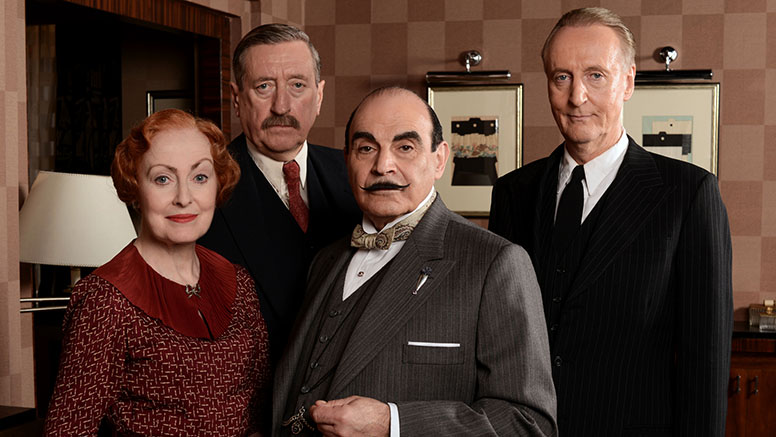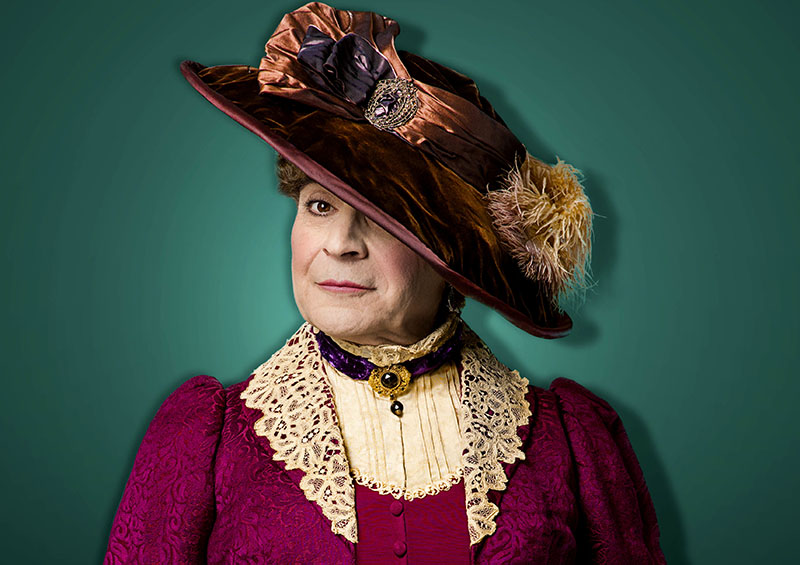One of the recent features of theatre in London’s West End and on the road has been the highly successful partnership of actor David Suchet and producer Kim Poster. They have collaborated very happily on such acclaimed productions as Peter Shaffer’s Amadeus and on two classics of the American stage in Miller’s All My Sons and O’Neill’s Long Day’s Journey into Night. They have now settled on something equally demanding, joining forces for a new production of Oscar Wilde’s enduring comedy The Importance of Being Earnest.
Even for an actor of Suchet’s versatility, it is still quite a leap from James Tyrone, the head of the acting family in the O’Neill play, to the redoubtable Lady Bracknell, the epitome of the late Victorian grande dame and a looming presence over the heart of this classic farce. One wonders who – or what – persuaded him to slip into female attire?
“Basically it was our producer Kim Poster,” he replies. “She was very keen that we should work together on something less heavy after the Miller and the O’Neill and coincidentally I’d also been looking for something lighter. Of course, I am a man, and I think that I agreed to Kim’s idea with slight trepidation because of that fact.
“However, once I’d looked into it and realised that such notable actors as Brian Bedford on Broadway and Geoffrey Rush in Australia had played Lady Bracknell, I could see that I’d be following in a line of leading male performers and I felt more comfortable.
He continues: “We’ve had female Hamlets, a female Richard II and both all-male and all-female productions of Shakespeares… Should every part be theoretically open to all actors, female and male? It’s hard to generalise. I think it depends on what the director wants to say.”
‘We’ve had female Hamlets, a female Richard II and both all-male and all-female productions of Shakespeares’
As we know from his long association with Hercule Poirot, Suchet is an actor who pays meticulous attention to the physical aspects of the character while exploring his -– or her – psychology. How did Suchet decided on how his Lady Bracknell would walk and talk?
“I’m not making her a pantomime dame with a falsetto voice,” he assures me. “I’ll also be wearing a boned corset which means that you can’t slouch and that you have to sit on the edge of your seat with your back straight.”
The Importance of Being Earnest was first performed in 1895, at the height of Wilde’s fame. Bursting with wit, irony and some of literatures most quotable lines, it follows two young dandies who adopt alter egos in order to pursue their lady loves, Gwendolen and Cecily, under Bracknell’s eagle eye.
“Wilde gave it the subtitle: A Trivial Comedy for Serious People and, as has often been said, playing comedy is a serious business. The Importance of Being Earnest is a glorious English farce in which Wilde mercilessly satirises the upper classes.”
Indeed, for all her snobbery (her reaction upon discovering the circumstances of her ‘s birth being one of the most memorable scenes), Lady B is not, Suchet, suggests, all she makes out to be.
“I think that she’s more nouveau riche than true upper class. As she herself admits, she had no fortune of any kind until she met and married Lord Bracknell. As a convert to the upper classes, she has become grander than the genuine aristocracy.”
There have been many Lady Bracknells down the years since including Judi Dench, Penelope Keith, Maggie Smith and Patricia Routledge. And they have all been faced with a perennial problem: how to deliver that tiny, two-word phrase “A handbag!” and so liberate it from the shadow cast over it by the late Dame Edith Evans, a celebrated Lady Bracknell in her day.
“Everybody asks you about that line and I intend to play it for real,” Suchet reports. “Ironically, Edith Evans is said to have regretted saying it in that way. It’s now akin to warning an actor about to play Hamlet that he should look out for the “To be or not to be” speech. And in any case, it is not the hand-bag that is the scandalous part of the story but the fact that it was discovered in a cloakroom at Victoria Station.”
Lady Bracknell likes to express herself with characteristic eloquence and weight and that poses potential problems. “These are the longest sentences I’ve ever had to learn! However, it’s your job to embrace that language: it would be such a mistake to cut it up and so break its particular rhythm. You have to find the breath to drive through those sentences.”

Last year television history was made when Suchet stepped down from the role of Hercule Poirot, having achieved his ambition of putting the entire Poirot canon on the television screen. It must have been hard to say Au Revoir to a character he had played, with intervals, for 25 years?
“It was a very sad day when we finished, as I knew it would be, and I miss Poirot very much. However he is still alive, appearing on television screens in different countries around the world. I won’t do any more Poirots on television but I’d be delighted to play him in the cinema…”
Suchet stresses that for all the international impact of his performance as Poirot, he was able to avoid the fate of being typecast. And he draws a further distinction between the parts he’s played in the theatre and his screen credits. Since bidding farewell to Poirot, David has made a documentary on St. Peter, played a Roman Catholic cardinal in The Last Confession and recorded a BBC Radio 3 production of Miller’s Death of a Salesman with Zoe Wanamaker, a frequent colleague of David’s.
“So that’s St. Peter, a Cardinal, Willy Loman and now Lady Bracknell. What glorious variety!” he exclaims. “I’m enormously grateful.”
After a long and distinguished career, Suchet could be forgiven for resting on his considerable laurels. But no, instead he is constantly re-evaluating how he approaches the task of acting.
‘It’s very easy simply to repeat your methods but pretty soon you’ll find yourself out of date’
“Remember that I came into the profession in 1969, after three years at drama school and appearing with the National Youth Theatre before that. So you’re talking about acting over a very long period of time. It’s very easy simply to repeat your methods but pretty soon you’ll find yourself out of date. I had felt for some time that acting styles were changing and when I was asked to write a foreword to Harold Guskin’s book How to Stop Acting which is the most wonderful tutorial book for actors, it encouraged me to find out how actors work today. Taking classes with Harold has hopefully enabled me get rid of some of those engrained habits and not to play safe, and to live more dangerously in the moment.”
However Suchet maintains his belief that the theatre works best when everybody involved in the process is given equal weight.
“We don’t want to go back to the days of directors’ or designers’ theatre where the actor tended to get lost in the director’s or the designer’s concept. I’ve never been a yes-man and if you don’t fight your corner, you’ll become a puppet. Acting is a creative art, just as creative as directing or designing and I’d argue that the best form of art is a collaborative art which is the theatre.
It’s been fascinating to see the parts I’ve been offered and the challenges I’ve been set and I think that it’s now necessary for me to be brave and not take the easy option and not approach playing Lady Bracknell with any pre-conceptions. In the theatre, your job is to serve the writer and we’ll bring everything we can to this production.”
The Importance of Being Earnest, 18-24 May, Cambridge Arts Theatre. 7.45pm; tickets from £15.

